This is what we get wrong about resilience and wellbeing: it’s not just about individual behaviors and practices. It has much, much more to do with what we call place — the context, culture, and environment in which we live and work and have our being.
In the shared staff workspace of Resilient Leaders Project, on the fourth floor of The Seattle School’s red brick building, there’s an entire wall devoted to a calendar. Each page is a calendar month, stuck up with blue painter’s tape, and covered with post-it notes that represent the due dates of the team’s major projects. It’s been untouched since March 2020 when we left the building to flatten the COVID-19 curve.
Nearly every project represented on that wall was moved or canceled to meet the needs of our shifting context and places we found ourselves: the COVID pandemic, of course, and then the crises that followed including the financial impact on an already economically disparate society, the racial awakening of white-bodied people, extensive wildfires and ecological destruction, the political polarization of the election, the anxiety of the presidential transition and Capitol insurrection. These events are significant globally and nationally, and each had an impact on us institutionally and as a Project — and on me as both a person and a leader.
Over these months, The Seattle School has adapted, pivoted, and developed our offerings to meet the needs of the global context. As part of that, we moved to online teaching and learning, and working from home. It feels as though I’ve also adapted my personal routines and rhythms to accommodate not just work from home but life from home — and ways to cope with the layers of stress that the last year-plus has held.
In many ways, the changes appear healthier: I stop working to eat lunch, I spend more time in intentional movement, and I regularly sleep between eight and nine hours a night — sometimes more on the weekends. Behaviorally, I’m hitting many wellness goals I was striving for in pre-pandemic times.
So why do I feel so awful?
This is what we get wrong about resilience and wellbeing: it’s not just about individual behaviors and practices. It has much, much more to do with what we call place — the context, culture, and environment in which we live and work and have our being.
We use “place” as a metaphor for these all-encompassing aspects of life, the concentric circles that start with our home and neighborhoods and expand to our nation and global systems. (Full transparency: we use this metaphor for easy recall in our framework of resilience: People, Practice, Purpose, Place.)
Place makes wellbeing natural or difficult. I don’t just mean this place, where you find yourself now. I also mean all the layered crises that the last twelve-and-counting months have entailed, every event that makes up the surrounding context of any moment. And it’s always context that facilitates or inhibits wellbeing.
Yes, I spend more time in focused exercise now, but that doesn’t make up for the loss of a daily commute walking multiple hills, and the regular movement between meetings in the building. I’m sleeping more, but not sleeping well, vexed by vivid and violent images, so of course I don’t wake feeling rested. The length of sleep I get is not an achievement, but a symptom of the fatigue of living in the place of this moment— a symptom of context intruding on even my unconscious mind.
Without an environment that encourages regular social interactions, I’m lonely. My social circle shrank to essentials — relationships in which we’re both willing to use screen time outside work. And in that loneliness, I’m stressed: my body misses the co-regulation of being near others.
In this “place” of working from home and isolation, I’m stressed about everything from personal exposure levels to the holes in our social fabric to signs of ecosystem collapse — and that stress isn’t a “disorder.” It’s appropriate to the situation; the events and challenges we’re facing merit stress.
No wonder I’m exhausted.
And these examples are tied to my own home and work — admittedly spaces where I’m privileged. Any work organization has immense power to support or undermine wellbeing, as we’ve seen with vulnerable working populations during this pandemic.
Access to paid time off, healthcare, flexible hours, or remote work policies have all been highlighted as contributing to life and death outcomes. For instance, agricultural workers are consistently at higher risk of exposure; in my home state of Washington, our hot spots are usually not the big cities, but the agricultural centers. Low-wage workers feel they aren’t able to take time off when sick because of financial pressures.
Some workers feel they are inappropriately deemed “essential” — strikers in my neighborhood carry signs that say “Our health should be above your bottom line.” The counterargument is that these workers agreed to their employment, which is true, but they agreed to it in a certain context — one in which they weren’t risking their health and life for that wage.
When an organization names work as essential, they should treat the workers as essential, and protect them with policies and practices that not only support the achievement of a task, but support their lives and wellbeing in their place of employment.
Context (place) is made up of concentric circles, like those that form when a pebble is thrown into a pond. Beyond our homes are the institutions in which we spend time; beyond that, our communities, our states, our nation — layers of structural contexts that have the power to shape our days and our lives.
Living near grocery stores that are stocked with highly processed foods and limited produce — or, conversely, living near one with an abundance of fresh and organic foods — drives our eating habits. The ‘walkability’ of a city or neighborhood can contribute to or undermine health. And, living in less ‘walkable’ places will mean we walk less and drive more, not only eliminating an opportunity for movement, but contributing to greenhouse gas emissions — which further lead to crises that put people’s health and safety at risk, as we saw this winter with the storms in Texas.
USAmerican culture and policies undermine the wellbeing of Asian, Black, and Indigeneous bodies pervasively — even activities that support health, like jogging and birding, can become threats.
So. If so much of our wellbeing and resilience is situated in our contextual place, what are we individual agents to do?
Most of us don’t have the power (or, let’s be honest, the energy) to drastically or immediately change the global context. But perhaps many of us have some agency in changing our more immediate, local environments: our home, our workplace culture, our organization’s or city’s policies.
Some questions to consider:
- What items at your desk or workplace support or undermine your wellbeing? Examples might be a glass of water, a comforting photo, or a favorite scented candle.
- How might you increase your contact with living beings? Perhaps it’s waving to neighbors, some intentional cuddle time with a pet, or bringing in more houseplants.
- What norms could you suggest to shift your workplace culture, for everyone’s benefit? A colleagues’ recent suggestion to set “speedy meetings” as the norm means that I’m getting more breathing space and bio breaks.
- What policies or changes in workflow would benefit your colleagues — especially those least represented in leadership spaces?
- What does your neighborhood or city need? Are there groups working towards or advocating for that change — and if so, how might you get involved to contribute your unique gifts and skills?
If you’re interested in learning more about how our place and context impacts our resilience and wellbeing, we invite you to learn more about our Resilience Circles.

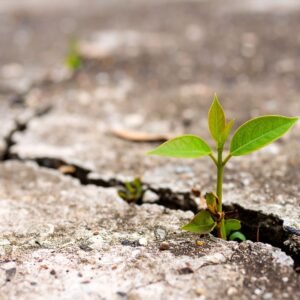
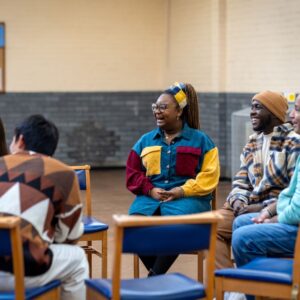
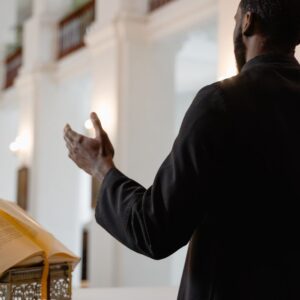



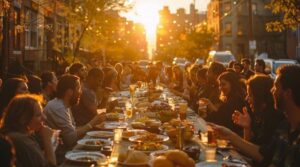
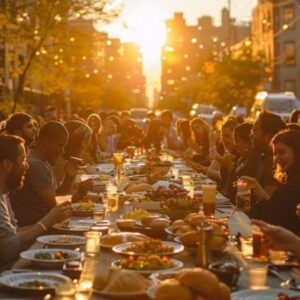
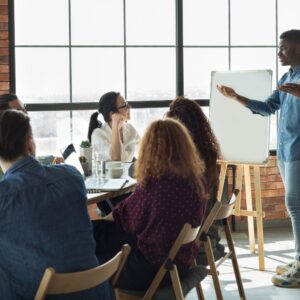
0 Comments